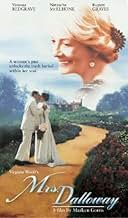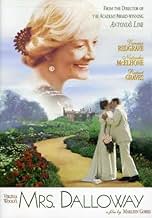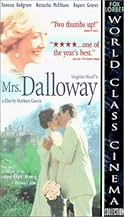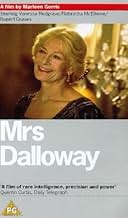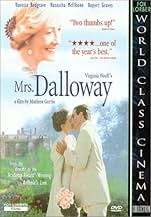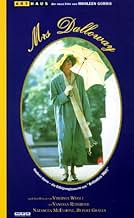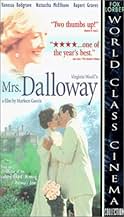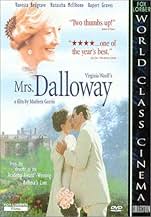IMDb रेटिंग
6.5/10
4.4 हज़ार
आपकी रेटिंग
अपनी भाषा में प्लॉट जोड़ेंIn 1923 London, socialite Clarissa Dalloway's well-planned party is overshadowed by the return of an old suitor she had known thirty-three years earlier.In 1923 London, socialite Clarissa Dalloway's well-planned party is overshadowed by the return of an old suitor she had known thirty-three years earlier.In 1923 London, socialite Clarissa Dalloway's well-planned party is overshadowed by the return of an old suitor she had known thirty-three years earlier.
- निर्देशक
- लेखक
- स्टार
- पुरस्कार
- 2 जीत और कुल 1 नामांकन
फ़ीचर्ड समीक्षाएं
I doubt that any film version of "Mrs Dalloway" can convey the breadth, depth, complexity, and radical vision of Virginia Woolf's novel. Although Gorris's version of it does seem to surpass typical expectations--and can stand on its own right as a rare adult character study movie, it still lacks Woolf's punch when it comes to dealing with her raw reality, her human presences, and her attacks on the bloodless psychiatric profession. Gorris is mainstream saddled, but more critically, she's limited by images that cannot take the measure of either the experimental content or more committed thoughts which only written forms can account for. For instance, there are more generics in the movie version, more single note characters and situations. And while Clarissa Dalloway and Septimus Warren Smith are the exclusive possessors of embodied consciousness and memory in the movie, this is hardly the case with the book.
I guess to comprehend what's going on (not easy because the movie's past--a simultaneous time period, seems a bit arbitrary, and character physical mismatches are not helpful) it's important to know that Woolf herself led something of a double life. Socially, she tended to hover on the surface as more of a performer or entertainer--and thus the "snob" epithet that is oft hurled her way; but privately she was, of course, the deeply conscious writer and thinker plagued with recurring mental illness, attempted suicides, and marriage upheavals which were so critical to the self she understood to be both real and dark.
Woolf wrote "Mrs Dalloway" as perhaps both an escape from her more tormented self and from the fashion of post-war disillusionment. Indeed, Mrs. Dalloway, the vibrant, party-loving social mediator, who Woolf herself, if not for certain life turns, could have become, initially stood alone in Woolf's novel. But this sunny version could not be tolerated. For Woolf, the writer, knew and understood too much of reality, too much of the war's devastation, too much of the underclass, and too much of the ice cold world of psychiatry, to let the party woman Clarissa's vibrancy take hold. Septimus Warren Smith was introduced to the novel not only as her counter figure, but also as a crucial part of Mrs Dalloway's consciousness without which she would be too glib, too shallow, too lacking in a sense of self.
One telling example of how the movie cannot handle the novel's radicalism is its take on Septimus Warren Smith's guilt. Gorris offers Smith's hallucinogenic encounters with Evans, which are both gripping and melodramatic, as the obvious causation (shell-shock) of his mental breakdown. But in Woolf's text what's more at stake for Smith is his emotional abandonment of his Italian wife, Rezia. Septimus, his war traumas not withstanding, exerts his own form of trauma onto his wife. It's this act of dehumanization, more personal than war, in which he shuts down communication with and discards his only ally, that drives his guilt. This is not a false self-blame, but a true self -blame, and a true guilt. But that such disengagement is socially acceptable and thus totally outside the narrow scope of his acquisitive, neurosis-classifiers psychiatrists, who deny any bitter complexities, only compounds his madness. So, Septimus' productive guilt, which should be most amenable to treatment, gets stifled by a power-based professional elite. And who understood this perverse, anti-human corps of experts better than Virginia Woolf, the writer, and author of the novel "Mrs. Dalloway," who was also thought to be lacking in proportion, and unable to adjust.
I guess to comprehend what's going on (not easy because the movie's past--a simultaneous time period, seems a bit arbitrary, and character physical mismatches are not helpful) it's important to know that Woolf herself led something of a double life. Socially, she tended to hover on the surface as more of a performer or entertainer--and thus the "snob" epithet that is oft hurled her way; but privately she was, of course, the deeply conscious writer and thinker plagued with recurring mental illness, attempted suicides, and marriage upheavals which were so critical to the self she understood to be both real and dark.
Woolf wrote "Mrs Dalloway" as perhaps both an escape from her more tormented self and from the fashion of post-war disillusionment. Indeed, Mrs. Dalloway, the vibrant, party-loving social mediator, who Woolf herself, if not for certain life turns, could have become, initially stood alone in Woolf's novel. But this sunny version could not be tolerated. For Woolf, the writer, knew and understood too much of reality, too much of the war's devastation, too much of the underclass, and too much of the ice cold world of psychiatry, to let the party woman Clarissa's vibrancy take hold. Septimus Warren Smith was introduced to the novel not only as her counter figure, but also as a crucial part of Mrs Dalloway's consciousness without which she would be too glib, too shallow, too lacking in a sense of self.
One telling example of how the movie cannot handle the novel's radicalism is its take on Septimus Warren Smith's guilt. Gorris offers Smith's hallucinogenic encounters with Evans, which are both gripping and melodramatic, as the obvious causation (shell-shock) of his mental breakdown. But in Woolf's text what's more at stake for Smith is his emotional abandonment of his Italian wife, Rezia. Septimus, his war traumas not withstanding, exerts his own form of trauma onto his wife. It's this act of dehumanization, more personal than war, in which he shuts down communication with and discards his only ally, that drives his guilt. This is not a false self-blame, but a true self -blame, and a true guilt. But that such disengagement is socially acceptable and thus totally outside the narrow scope of his acquisitive, neurosis-classifiers psychiatrists, who deny any bitter complexities, only compounds his madness. So, Septimus' productive guilt, which should be most amenable to treatment, gets stifled by a power-based professional elite. And who understood this perverse, anti-human corps of experts better than Virginia Woolf, the writer, and author of the novel "Mrs. Dalloway," who was also thought to be lacking in proportion, and unable to adjust.
This is a beautiful little film, which portrays the book admirably. When put up against its counterpart in The Hours I think it compares favourably. For sure it is a much smaller film in both stature and actor profiles, but this does not make it worse, in fact quite the contrary.
The English cast do a great job, on this essentially English story, with strong performances all around, notably from the leads from both eras. It is nicely shot, and the script has been well managed, and achievement for a Virginia Woolf novel.
I often find myself trying to pick out flaws in films like this, but the only possible complaint I can think of is the lack of continuity in height ratio between the leads over the two eras, petty some might say, and actually a small price you might expect to pay when you cast the wonderful Vanessa Redgrave.
I can't help feel sorry for those people who don't get this film. If Virginia Woolf isn't your cup of tea fair enough, but to think this and therefore the book is boring can only mean a lack of understanding or appreciation of Woolf's views on the point of life.
In essence when I watched this film it charmed me for an hour and a half, and then when it was finished left me questioning the value of my life, and important decision I had made, and was yet to make, which if you have ever read it is exactly what the book does.
The English cast do a great job, on this essentially English story, with strong performances all around, notably from the leads from both eras. It is nicely shot, and the script has been well managed, and achievement for a Virginia Woolf novel.
I often find myself trying to pick out flaws in films like this, but the only possible complaint I can think of is the lack of continuity in height ratio between the leads over the two eras, petty some might say, and actually a small price you might expect to pay when you cast the wonderful Vanessa Redgrave.
I can't help feel sorry for those people who don't get this film. If Virginia Woolf isn't your cup of tea fair enough, but to think this and therefore the book is boring can only mean a lack of understanding or appreciation of Woolf's views on the point of life.
In essence when I watched this film it charmed me for an hour and a half, and then when it was finished left me questioning the value of my life, and important decision I had made, and was yet to make, which if you have ever read it is exactly what the book does.
I enjoyed this movie very much, although I really loved the novel a bit more, but that's always the case it seems. Vanessa Redgrave and Natasha McElhone make a GREAT older/younger version of each other, and Rupert Graves gives a stellar performance as a young man dealing with the impact of war. This is a gently told tale, but it's done very well. Worth a look.
10anelson1
Everyone doesn't like everything, so I'm not surprised that some people find the movie of Mrs. Dalloway boring. They probably would find the book boring too. But it's depressing. So they won't agree with some of us who see the novel as one of the great works of the 20th century, and the film as a truly remarkable and beautiful capturing of it. The only touch I regretted was the opening of the film with the Septimus Warren-Smith war scenes. The opening really belongs with Mrs. D. and her first words, "I will buy the flowers myself." After that moment, it's a quiet day but a beautiful and sensitive one.
While I agree with some of the more perceptive comments made here, I have a few of my own to add. First, the novel on which this film is based is an all-time favorite of mine and I'm happy to have seen it beautifully translated into cinematic form. The contrast between the personal and inner life of an upper class English woman and the horrors produced by war (in this case, symbolized through the experience of one man, brilliantly portrayed) is both moving and exacting. Vanessa Redgrave gives a splendid performance as Clarissa...sensitive, radiant, conservative and uncertain about life decisions as she looks back (nicely depicted in flashback). Michael Kitchen as her would-be lover of old is perfect for the role...quietly romantic, sexy, with just the right British propriety. The troubled young war veteran and his wife are well cast and Marleen Gorris should be credited with graceful directing.
क्या आपको पता है
- ट्रिवियाFirst screenplay written by Eileen Atkins.
- गूफ़In the flashback scenes with the younger actors, Peter is slightly taller than Clarissa. When they dance together at the party, he is considerably shorter than her.
- भाव
Peter Walsh: [Talking about Clarissa in 1923] She broke my heart, and you can't love like that twice.
- साउंडट्रैकTime for Old Time
Composed by Jack Trombey (as J. Trombey)
टॉप पसंद
रेटिंग देने के लिए साइन-इन करें और वैयक्तिकृत सुझावों के लिए वॉचलिस्ट करें
- How long is Mrs Dalloway?Alexa द्वारा संचालित
विवरण
- रिलीज़ की तारीख़
- कंट्री ऑफ़ ओरिजिन
- भाषा
- इस रूप में भी जाना जाता है
- Virginia Woolf's Mrs Dalloway
- फ़िल्माने की जगहें
- Duke of York Column, St James's, लंदन, इंग्लैंड, यूनाइटेड किंगडम(Mrs Dalloway coming back from shopping flowers)
- उत्पादन कंपनियां
- IMDbPro पर और कंपनी क्रेडिट देखें
बॉक्स ऑफ़िस
- US और कनाडा में सकल
- $33,09,421
- US और कनाडा में पहले सप्ताह में कुल कमाई
- $90,127
- 22 फ़र॰ 1998
- दुनिया भर में सकल
- $33,09,421
- चलने की अवधि1 घंटा 37 मिनट
- रंग
- ध्वनि मिश्रण
- पक्ष अनुपात
- 1.85 : 1
इस पेज में योगदान दें
किसी बदलाव का सुझाव दें या अनुपलब्ध कॉन्टेंट जोड़ें



